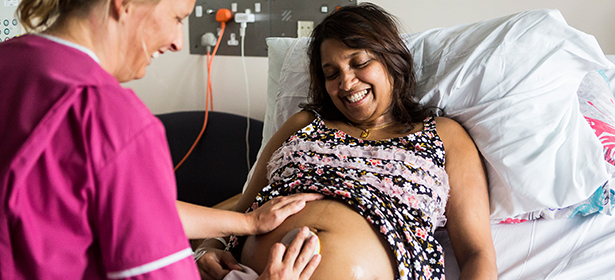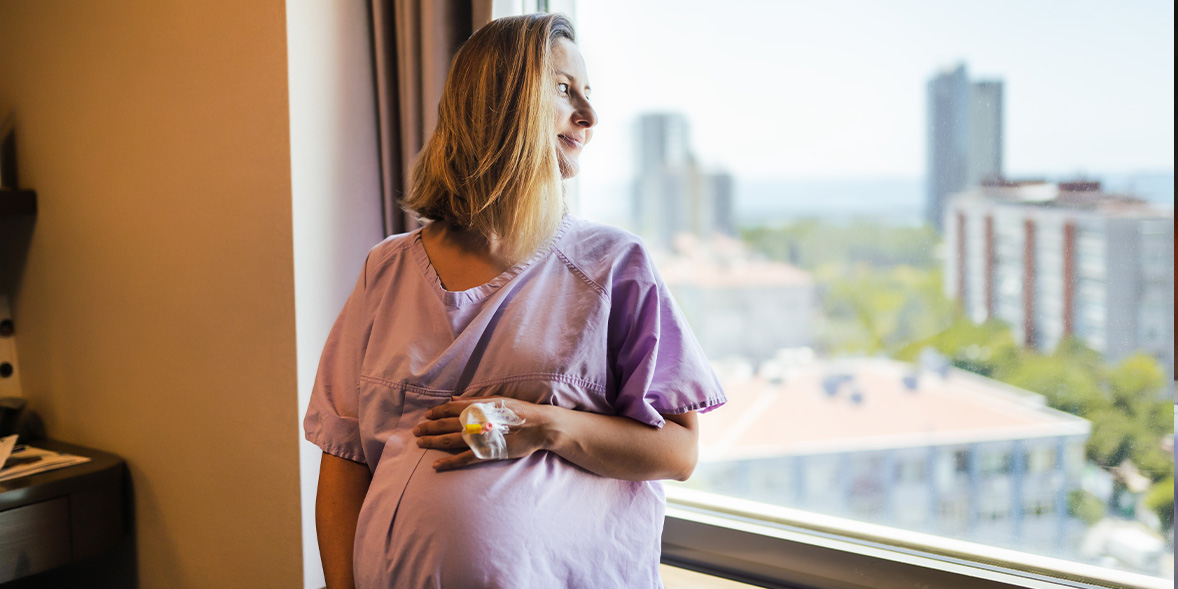
Looking to buy private health insurance?
Find the right private health insurance policy using the service provided by LifeSearch.
Find out moreBy clicking a retailer link you consent to third-party cookies that track your onward journey. If you make a purchase, Which? will receive an affiliate commission, which supports our mission to be the UK's consumer champion.

In this article
From paying for scans and doulas to private hospitals and amenity beds, this guide explains what’s available if you decide to go private before, during or after giving birth.
We also list the pros and cons for both NHS and private maternity services and explain what you might expect to pay if you choose private care.
For ways to keep your family living costs down, and kids of all ages happy, get our Family newsletter – it's free monthly

Best pregnancy pillows: we enlisted mums-to-be to test 10 popular pregnancy and nursing pillows costing from £25 up to £160

Yes, you can choose to give birth in a private maternity hospital or unit, or you can even pick and choose aspects of private maternity care that suit your needs.
For example, although the NHS offers expectant mums at least two ultrasound scans during pregnancy, some parents-to-be would like 3D or 4D scans to see the baby’s features more closely. These are only available privately.
Giving birth in a private hospital or in an NHS private wing means your chosen consultant will look after you for your antenatal care, delivery and postnatal care, unless you choose midwife-led care.
What to pack in your hospital bag – from newborn necessities to labour ward essentials including ear plugs, our guide makes sure you have everything you need

There isn't a 'one size fits all' answer to this and although many private units break down the various costs on their websites for transparency, every birth is unique.
However, we've looked at the main elements of private maternity care – the package price, the extra costs and professional fees – to help give you a rough idea of what your final bill could be.
You'll find prices online or in the brochures of private maternity hospitals or units and these outline how much you'll pay for a consultant-led delivery (vaginal or Caesarean) or a midwife-led delivery (where available).
For a vaginal delivery, the lowest basic 'package' price we found for a consultant-led package was £6,075 and the highest was £7,495, and for a C-section, the price varied from £7,500 up to £9,350.
However, this price tends to cover hospital fees only and although this may include fundamentals such as midwifery care during labour and infant feeding support, there is plenty that isn't included – and you'll pay extra for.
You also need to factor in your consultant obstetrician's professional fees (and possibly those of an anaesthetist, which can be as much as £1,650), not to mention any extra costs incurred along the way (see further down).
| Private maternity unit/hospital | Consultant-led vaginal delivery cost* | Consultant-led Caesarean delivery cost* |
|---|---|---|
| Clayton Ward Queen Charlotte's and Chelsea Hospital, London | £6,600 | £8,250 |
| Fitzrovia Suite University College Hospital, London | £6,200 | £7,750 |
| The Kensington Wing Chelsea and Westminster Hospital, London | £6,625 - £7,750 (Platinum Package) | £8,375 - £9,350 (Platinum Package) |
| Kingston Private Health Kingston upon Thames, Surrey | £6,075 - £7,350 | £7.895 - £8,825 |
| Lindo Wing St Mary's Hospital, London | £6,995 | £8,695 |
| The Portland Hospital London | £7,495 | £8,700 (elective Caesarean) or £8,845 (emergency Caesarean) |
| Westminster Maternity Suite Guy's and St Thomas' Hospital, London | £6,200 | £7,500 |
Table shows cost of basic maternity packages and fees at various private maternity units (in alphabetical order) as of 15 October 2024 (subject to change so check with the unit directly).* Price doesn't include consultant obstetrician fees and, where applicable, consultant anaesthetist fees, which are billed separately.
Midwife-led care packages may also be available. For example, a midwifery-led vaginal birth at Queen Charlotte's and Chelsea Hospital's Clayton ward is £8,500 and £10,585-£12,085 at the Portland Hospital.
You'll also need funds for additional services here are some examples of what these might be (based on prices from The Kensington Wing):
There'll be additional costs for multiple births as well as the price of travelling to your chosen facility (most are in the London area), plus be prepared to pay a deposit that’s either a percentage or a flat fee.
As every birth is unique it's impossible to give a total cost in advance but we've totted up how much it might cost if you had a consultant-led vaginal birth in a private wing along with some basic extras*.
Package price = £6,625
Extra costs* = £8,498
Consultant obstetrician fees** = £6,000
Total = £21,123
* Individual blood tests £24, histopathology £120, Harmony test £400, £530 as day case at prenatal ward, external cephalic version (ECV, or turning the baby) £525, epidural £850 and private unit epidural charge £275, induction from £525, instrumental delivery £525 and anaesthesia £400, surgical delivery of placenta £1,540, cervical or abdominal sutures £900 plus anaesthetic £300 and suture removal £200, dressings from £50, pharmacy charges for prescriptions and medication from £9, additional night in postnatal room £1,325. Based on prices from the Kensington Wing at Chelsea and Westminster Hospital in London, correct as of 15 October 2024.
** Based on fees of £6,000-£9,000 charged by a consultant obstetrician at the Kensington Wing.
Our guide for babyproofing your home will help you to identify hazards and make your living space safer for your little one
No. Pregnancy and childbirth are listed as standard health exclusions by private health insurers, because they’re considered lifestyle choices rather than illnesses.
Conditions that can be caused only by pregnancy or childbirth aren’t covered, either, although a condition that can also be experienced outside pregnancy and childbirth may be.
That said, some complications arising from pregnancy and childbirth that affect the health of the mother may be covered by your policy. These include miscarriage, ectopic pregnancy and retained placenta after the birth.
There may be occasions when a C-section is covered, but this depends on factors such as your insurer, your policy and whether your consultant deems the C-section to be medically necessary.
Check your policy to see what is and isn’t covered. Check, too, how long you need to have had the cover for to be entitled to make any pregnancy-related claims.
Some insurance providers offer a small windfall to new parents in the form of a one-off cash ‘baby bonus’ benefit. This can amount to as much as £100 following childbirth or adoption.
Private antenatal scans and antenatal classes aren’t covered by private health insurance, but you can get these on the NHS as well as paying for them privately.

Find the right private health insurance policy using the service provided by LifeSearch.
Find out more
With the NHS, you get seven to 10 antenatal appointments with a midwife, as well as blood tests and at least two free ultrasound scans.
If you have more complicated needs, you’ll also see a consultant (doctor) in addition to your midwife appointments.
Most women have their baby in an NHS maternity unit, but if you choose to have your baby at home, two NHS midwives will come to support you during the birth.
You’ll always have your own room in a hospital or birth centre for the birth itself, and be looked after by midwives. However, if you’re induced – and also if you’re staying overnight following the birth – you may need to spend time on a shared antenatal ward.
You’ll go home a few hours after a straightforward birth or after a couple of days if you've had a C-section or experienced complications.
You’ll have an average of three to four postnatal appointments with NHS midwives once discharged, either at your home, or at a local clinic or children’s centre.
Best baby formula milk – find out everything you need to know including how the leading formula milk brands compare

You can still choose aspects of private maternity care to suit your needs, even if you’re not going completely private.
Our February 2022 survey showed that out of just over 1,400 parents, nearly all had paid for private services during pregnancy or birth.
Our 2022 research showed that a large number of parents (83%) had a private scan during the pregnancy and 19% had a private blood test.
The NHS provides you with all the diagnostic scans you need, but some people pay for extras, such as 3D and 4D scans, at a private facility to see their baby’s features more clearly and to get video footage of it.
For more information see our guide to NHS and private ultrasound scans during pregnancy.
A private room within an NHS maternity unit isn't the same as private care, but it's way of having more privacy for a relatively small outlay (from around £80 up to £400, depending on location).
Although these can't be booked in advance and there's no guarantee you'll get one, mention your request to the labour ward midwife after the birth, in case there's availability.
Our research showed that while just 6% of parents opted for a private amenity room in the NHS, 97% found it useful.
A doula is trained in supporting expectant and new parents, and their services can be tailored to your needs.
Although they're not intended to replace midwives or other health staff, they can work with you during your pregnancy, be your birth partner or advocate, or give you postnatal support.
In our survey, 5% of respondents paid to have a doula and 90% of these said they found it useful.
Costs vary, but Doula UK says many doulas have flexibility when it comes to fees. The NCT says if you have a due date between the end of February and mid-April, advanced student NCT doulas may be an option for high-quality support at a reduced cost.

The rules say no one should ever be denied NHS maternity care; however, in some cases, it isn’t free.
The UK has a residence-based healthcare system so if you are ‘ordinarily resident’ here, you’re entitled to free NHS maternity care, whatever your citizenship or immigration status.
The charity Maternity Action has a guide to who is considered ordinarily resident in the UK to help you see where you stand.
Each NHS Trust has an Overseas Visitor Team, with responsibility for reaching a decision about whether you’ll be charged for your maternity care if you aren’t ordinarily resident.
Yes, and this may help you to keep the costs down.
For example, the fees for obstetric care within the private facility of King’s College London are £7,500 from 12 weeks of pregnancy, £6,500 from 28 weeks, £6,000 from 32 weeks and £5,500 from 36 weeks (in addition to hospital and other fees).
However, in other situations, you could find that the amount it costs is the same as if you started private treatment earlier on in your pregnancy.
For example, IMUK, which represents independent midwifery, says that because an independent midwife has fixed costs and will often have to work harder within a short space of time to give you the care you need, you still pay the full amount.
You should be aware that, as per Department of Health guidelines, if you transfer from private to NHS care, you’re not permitted to change back to private care.
Best disposable nappies: see how parents rated Pampers against Aldi, Lidl, Tesco, Asda and other own-label nappies

The availability of private or ‘amenity’ rooms following delivery varies from one hospital to the next, as does the price.
Some offer single amenity rooms with shared facilities, others have private rooms with ensuite facilities and there may also be additional provisions such as tea and coffee, a TV and scope for someone to stay with you overnight.
However, they tend to be allocated on a first-come, first-served basis and can’t be held or booked in advance, so there’s no guarantee you’ll get one. Plus you may have to relocate to a postnatal ward to accommodate someone with a clinical need greater than yours.
Costs vary, but can start at around £80 for a single room with shared bathroom facilities, rising to, in some cases, upwards of £400 a night.
Whatever you end up paying, you are still an NHS patient and won’t be given preferential treatment.
If you want more flexibility in your maternity care than the NHS can provide, you can look into hiring a private or independent midwife.
IMUK says a complete package of care throughout pregnancy, birth and the postnatal period costs anywhere between £2,000 and £5,000, although it can cost up to £9,000.
Most independent midwives are happy to accept payment in instalments or flexible payment plans, and in some special circumstances they may consider caring for women for a reduced fee.
In this video, an independent midwife explains what she believes are the benefits of using a paid-for, non-NHS midwife for maternity care.
Many women who choose to have an independent or private midwife are planning to have a home birth.
Private midwives can be a good option if you’re finding it difficult to get support for a home birth from your local NHS services.
If you’re having a home birth with a private midwife, there’s still the possibility you may need to be transferred to hospital because you or your baby needs extra help.
In this case, the NHS midwives and doctors in the hospital will take over your care. However, your private midwife will still be there to act as a supportive birth partner.
Women who have given birth with private midwives can pay to carry on seeing the same midwife they had throughout their pregnancy, after the baby is born.
Others may choose to supplement their NHS postnatal care by having additional private appointments as well.
In addition to providing continuity of care, a private midwife can assist if you’re having problems with breastfeeding and will also be a familiar face if you’ve had a challenging or difficult birth.
See all our baby and child reviews and advice for information on child car seats, pushchairs, baby monitors, nursery furniture and much more
Which? Limited is registered in England and Wales to 2 Marylebone Road, London NW1 4DF, company number 00677665 and is an Introducer Appointed Representative (FRN 610689) of the following:1. Inspop.com Ltd for the introduction of non-investment motor, home, travel and pet insurance, who are authorised and regulated by the Financial Conduct Authority (FCA) to provide advice and arrange non-investment motor, home, travel and pet insurance products (FRN310635). Inspop.com Ltd is authorised and regulated by the Financial Conduct Authority (FCA) to provide advice and arrange non-investment motor, home, travel and pet insurance products (FRN310635) and is registered in England and Wales to Greyfriars House, Greyfriars Road, Cardiff, South Wales, CF10 3AL, company number 03857130. Confused.com is a trading name of Inspop.com Ltd. 2. LifeSearch Partners Limited (FRN656479), for the introduction of Pure Protection Contracts and Private Health Insurance, who are authorised and regulated by the FCA to provide advice and arrange Pure Protection Contracts and Private Health Insurance Contracts. LifeSearch Partners Ltd is registered in England and Wales to 3000a Parkway, Whiteley, Hampshire, PO15 7FX, company number 03412386.3. HUB Financial Solutions, for the introduction of equity release advice, who are authorised and regulated by the Financial Conduct Authority (‘FCA’) to provide advice and guidance on financial products for those who have retired or are approaching retirement (FCA Firm Reference Number: 455713). HUB Financial Solutions is registered in England and Wales to Enterprise House, Bancroft Road, Reigate, Surrey RH12 7RP, company number 05125701.4. Alan Boswell Insurance Brokers Ltd (FRN 301), for the introduction of non-investment landlord insurances, who are authorised and regulated by the Financial Conduct Authority to provide advice and arrange insurance contracts. Alan Boswell insurance brokers Ltd is registered in England at Prospect House, Rouen Rd, Norwich NR1 1RE, company number 02591252.Other financial services: Mortgage service provided by London & Country Mortgages (L&C), Unit 26 (2.06), Newark Works, 2 Foundry Lane, Bath BA2 3GZ. London & Country are authorised and regulated by the Financial Conduct Authority (registered number: 143002). The FCA does not regulate most Buy to Let mortgages. Your home or property may be repossessed if you do not keep up repayments on your mortgage. We do not make, nor do we seek to make, any recommendations or personalised advice on financial products or services that are regulated by the FCA, as we’re not regulated or authorised by the FCA to advise you in this way. In some cases, however, we have included links to regulated brands or providers with whom we have a commercial relationship and, if you choose to, you can buy a product from our commercial partners. If you go ahead and buy a product using our link, we will receive a commission to help fund our not-for-profit mission and our campaigns work as a champion for the UK consumer. Please note that a link alone does not constitute an endorsement by Which?.